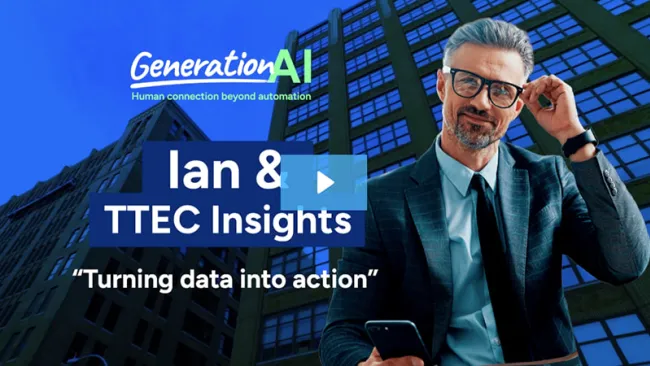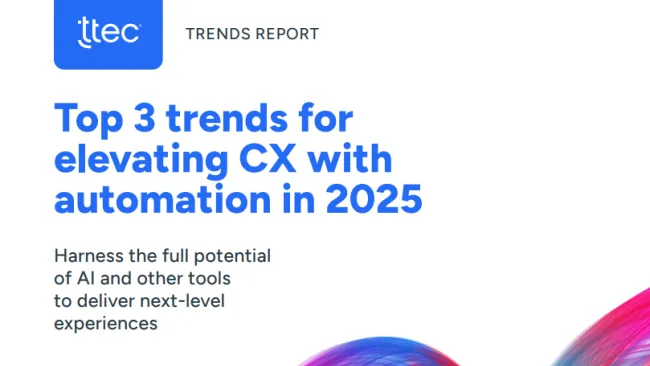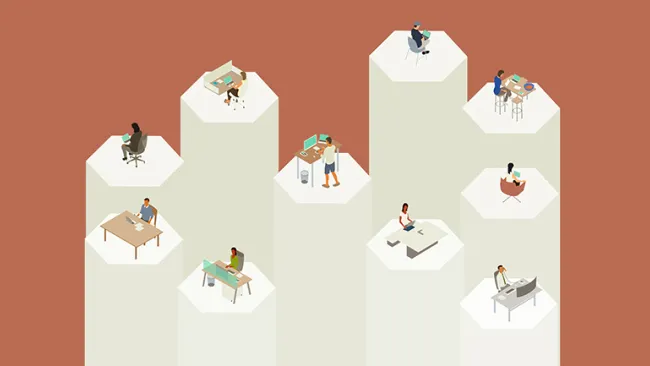In the first of our series exploring the people behind amazing customer experience delivery, we delve into the role of healthcare licensed agents. Liz Glagowski interviews TTEC vice presidents Ebony Langston and Shelley Larrick about what licensed agents do and how important they are to create a good impression with health insurance members and prospects.
Key takeaways:
- The licensed agent acts as a trusted advisor for the consumer to help explain what their health insurance benefit options are and match them to their unique healthcare needs
- The professional position has great career growth potential as the health insurance industry evolves
- Licensed agents are a critical part of the healthcare ecosystem that influences people’s health and well-being
Transcript
Liz Glagowski: Hi, and welcome to the CX Pod. I'm Liz Glagowski, editor of the Customer Strategist Journal. Today we're launching a new series to learn more about the people and roles behind great customer experience programs. For this episode, we're focusing on the unsung heroes of a great health insurance ecosystem the licensed agent, what they do, why their job is so critical, and how they help customers and members.
So with me to discuss are Ebony Langston and Shelley Larrick of TTEC’s Healthcare Practice. They bring decades of experience supporting health care clients and working with licensed agents. Welcome to the program, ladies.
I'm very excited to talk to you about this topic today. So let's start with the basics. For someone who's not familiar with the with the role, what does a licensed agent or associate do and what makes someone successful in this role? And maybe Ebony, we can start with you.
Ebony Langston: You know, healthcare is unfortunately a little complicated to understand for the average consumer sometimes. And so the licensed agent is really there to be a trusted advisor for the consumer to help explain what their benefit options are and really help match them to the healthcare needs that particular consumer has. So the licensed agent is really there to be, like I said, a trusted advisor and help the consumer choose what's going to be the best benefit option for them.
LG: I've read that we've got higher enrollment in in healthcare than ever before. So obviously, you know, consumers are looking for help navigating some of these some of these choices they're going to need in their health plan. So, Shelley what would you say make someone successful in this role?
Shelley Larrick: I would say somebody that has compassion, good at building rapport quickly, people that get satisfaction and helping seniors and individuals have the right health care coverage so they have peace of mind when they need it for sure. I think that would be important. I think people that want a rewarding job knowing that, you know, you're coming to work and you literally could be part of saving somebody's life at some point.
Ensuring they have proper health care coverage helps seniors and individuals live happier and healthy lives. And me, personally, I feel very good getting up, knowing I'm leading an organization that does that.
LG: That's really a great point. And you're not just doing the job, you are helping someone have the coverage they need to maybe go get preventative services or step into taking more action with their health care that they might not have been able to do before. I love that. So how would this role differ from a typical associate that's not in the health care industry?
EL: In our health care is a very regulated industry. And so while I think every single role that supports a member or a consumer in their health care journey is important. That license agent who's there at the beginning of that process is really key because again, they are helping the consumer really understand how this health plan is going to benefit them and they are responsible for understanding, you know, representing the health plan as well within all the rules and regulations that exist.
So, you know, a little bit different than other roles. It really is a professional position. There is a license that you have to study for and pass an exam in order to show the state, show the health plans that you are qualified and knowledgeable, and show consumers as well that you are qualified and knowledgeable in regards to being able to speak to what that the features and the benefits of the plan simply are.
SL: And I could probably just piggyback that real quick to there's a couple of different ways they can come to us, right? So they can come, like Ebony said, without a health care license. And we have what's called College of Insurance, and we'll help you get that license. And then you would go on to sell seniors or individuals like Ebony said, supplemental plans to make sure they're covered.
And then the other way, we have many, many people that already have their health care license and they choose to come work for TTEC. They would just be answering the phone. Right, and helping individuals sign up with that supplemental plan to ensure they're covered. We have, you know, people with their license. Sometimes it's, you know, somebody that just wants their lead, you know, paid for, not have not having to worry about that at all and just come to work, sit down and just help individuals.
And then, you know, I do have some folks that are retired health care agents, licensed agents. They still want to be able to do that, but maybe not all year long. So we've got several different ways that the individuals could contest.
LG: Can you talk a little bit then about the career path of a license associate? You know, why might this be a good option for someone looking for a career and not just a quick, you know, short term contact center job?
EL: I can speak first from experience. Eighteen years ago when I started in contact centers, it was as a licensed health insurance agent over the phone, kind of early in the days of telesales, when carriers were just starting to provide that as a channel. But it's a great opportunity to kind of support the health care system without having to be a doctor or nurse.
That was kind of my personal journey. I thought I wanted to be a doctor and then kind of change path. But it's still a great way to support the health care ecosystem by helping consumers, in my opinion, by helping consumers find coverage. And then you get to learn a lot about just the inner workings of health care that can help you move into other areas in the ecosystem, if that's something you desire.
SL: Maybe you start your career as a licensed agent, maybe you stay and you do that year after year. But if you're interested in something else, we literally have thousands of jobs that are available to individuals, and that's one of the things that happens at the end of the season. There's a few different things that can happen.
It would be either you're a top performer and you stay in the off season selling plans, during the special enrollment period or we work really hard to try to match you to another account. And in the off season and you work there and then you come back to us and sell health care during the season, or perhaps you find interest in another job or a leadership role or anything within TTEC. There's just thousands of opportunities that you would have working for a company like Tech.
LG: I love Ebony that you've got a living success story right here about how you've been able to advance and really become a leader within the company. That's wonderful. Shelley, can you talk for people who might not be familiar with it, what the busy season would be? And if you are interested in being a licensed agent, when that would really kick in?
SL: We're hiring starting even now, depending on the client, you know, we start ramping about now and it gets pretty active around August, September, the peak period for open enrollment for seniors is October 15th through December 7th. So that's a really big peak for us as well as individuals under 65. We have a few programs that do that and it's November 1st through the end of January.
And I say that in general is peak season, but I think everybody's you've been paying attention, lots of activity going on as far as special enrollment period. So it could you could vary a little bit, but in essence, those are busy periods during the fourth quarter and first part of January.
LG: And then once that ends. So how do you have any specific examples of how TTEC is able to stay engaged with these associates when, you know, once February hits?
SL: Like I said, there there's we start working like it were after. I mean, immediately really after you start we start working with our talent acquisition team to understand, you know, what roles will be available post the season. Again, all almost all of my clients do keep a group of individuals. It's usually your top performers that can stay on year round in that licensed agent role.
And then others may move to another to another client, perhaps in health care that is actually doing member service calls. Once they sign up for health care, well, then they may call in and they may have questions about their health care. So you could move to an account like that. Or again, like I said, there will be other jobs to certainly that you would be available to apply for if you're interested in something outside of health care or a leadership role.
LG: For someone who might be interested in becoming a licensed associate, what recommendations might you have to get have them get set up to really get through the process and succeed here at TTEC?
EL: I think first, if you're not licensed already, you know, we have the opportunity to go through our College of Insurance, where we will help put you through the lessons and the teachings that you need in order to be able to sit for the state exam and get your license. And we have a whole licensing department to help support you through that pre and post licensing process to get any other licenses in other states that you need as well as appointments with our different carriers.
The great thing about the world today is that, you know, pretty much everything is available work at home. So almost all of our licensed agent opportunities are working at home. And so for that, you just want to make sure you have a quiet space, a strong Internet in order to help support.
SL: Yeah, that's a great point. Yes. So right now our jobs are at work at home positions. So you would want to a good work area that you could work from. I was thinking to many as you were talking about your story of starting on the phones, like almost all of my leaders, I think all of my leaders right now did just that, you know, including myself over 30 years ago. I wasn't a licensed agent because I don't you know, I don't think we had that telesales line of business.
But again, whoever they are, if they're looking for a career, you know, we really want and go to TTECjobs.com and apply because that's the way we started. My current role now as a vice president of operations over all of the telesales and Ebony herself is also a vice president. That's how we started. We just went applied and started taking some calls.
LG: Thank you both for what a great discussion. And I love the idea that we can really stress people who are working from home to be able to support them. So if any listeners are interested in learning more, please visit TTECjobs.com. And we encourage you to apply either for a licensed associate position or any of the other positions we may have as Shelley mentioned, I think there are sometimes thousands of opportunities here within the company.
So we really encourage you to apply at TTECjobs.com. That does it for us at the CX Pod. Stay tuned for more behind the scenes of CX discussions and hoping to get more focus areas on different jobs within the contact center and customer experience world. So stay tuned for that and we will see you next time.
Have a great day. Thanks for listening. Look for more insights by subscribing to the CX Pod where you get your podcasts or visit us at the theCXpod.com or TTEC.com.














